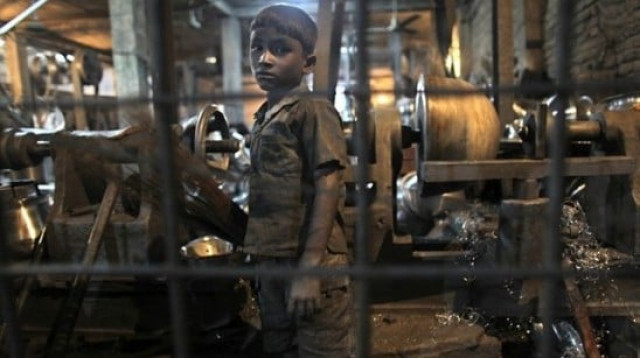Child rights: Law to set minimum age for child work
No child less than 14 years of age to be employable but the question of child domestic labour remains unresolved.

The Labour Department is set to propose 14 years as the minimum age of employment in the draft of the Prohibition of the Employment of Children Act (PECA), The Express Tribune has learnt.
The PECA is set to replace the Employment of Children Act (ECA) 1991.
Saeed Awan, the director of the Centre for Improvement of Working Conditions and Environment (CIWCE) in the Labour Department, told The Express Tribune that the ECA did not set a minimum age of employment.
“The new child labour law will change this basic premise,” he said.
The ECA defines a ‘child’ as one below the age of 14 and an ‘adolescent’ as one between the ages of 14 and 18. It banned child labour in four occupations and 34 processes. For other occupations, it offered a regulatory mechanism for both children and adolescents.
“The new law will prohibit children below 14 years of age from being employed and ensure regulatory mechanisms for adolescent workers,” he said. People enter the workforce before the age of 18 all over the world, he said.
“We cannot prohibit adolescents from working,” he said, “but strict monitoring is required at workplaces.”
He said that the passage of Article 25A into the constitution, making education for 5 to 16 year olds the responsibility of the state, mandated that the old law overseeing the employment of children be revised.
The current ECA would be in conflict with the Constitution since a working child wouldn’t be able to focus on studies, Awan said.
The monitoring provisions for adolescents mean that the PECA would not conflict with Article 25A, he said.
Syed Hasnat Javed, director of Headquarters at the Labour department, told The Tribune that the draft of the PECA had been in the pipeline for the last four months and would be forwarded to the Labour Secretary next week.
“The PECA will replace ECA once approved,” he said, “and will remedy its flaws.”
The ECA’s provisions for child employment will now apply to just the 14 to 18 years age group, he said.
The mechanisms pertaining to working hours and wages have also been revised, he said.
PECA does not include child domestic labour (CDL) in the list of banned occupations, though the law would allow the list to be reviewed.
Saeed Awan said that even ILO conventions offered an exception to child domestic workers who worked under the supervision of their parents.
He regretted that the Labour Department is unable to regulate CDL due to the non-availability of home surveys and staff to count and monitor child workers.
“The Social Welfare Department is responsible for ensuring checks on CDL,” he said.
“Penalising parents whose children are working as CDL through the establishment of an efficient complaint mechanism could be a temporary solutions to the issue,” he said.
Published in The Express Tribune, May 28th, 2012.



















COMMENTS
Comments are moderated and generally will be posted if they are on-topic and not abusive.
For more information, please see our Comments FAQ